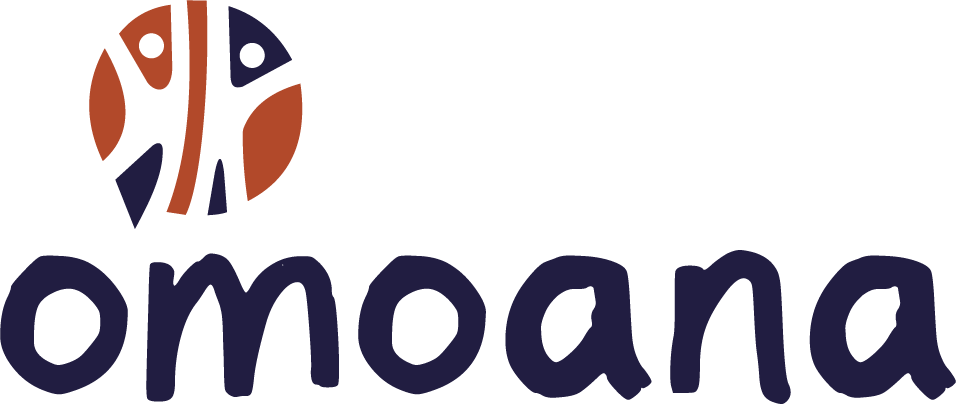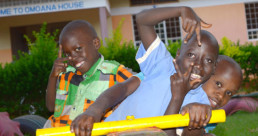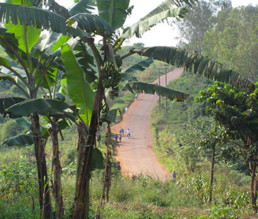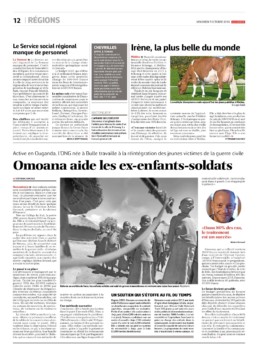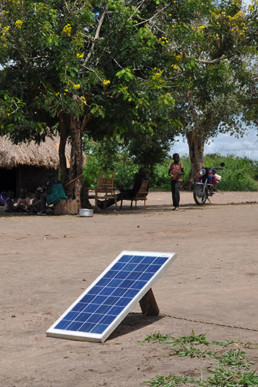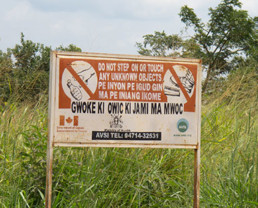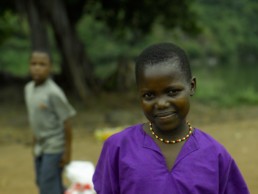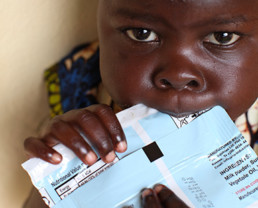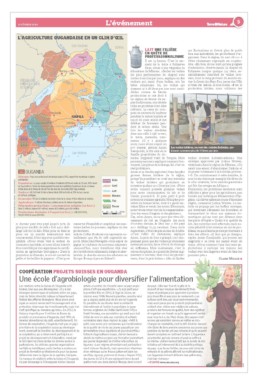Visit from humanitarian professionals
Omoana House, much more than a project
In April 2016, humanitarian professionals engaged in a Certificate in Project Methodology with the Centre d’étude et de recherche en action humanitaire (CERAH) visited Omoana House. They were gathered for 10 days in Uganda for the “residential” part of the training (a distance learning course that lasts 7 months and also includes distance sessions and 4 months of coaching). A practical case study was organized with Omoana House, during which the students talked to HIV-positive teenagers about their daily challenges and how Omoana House meets them. Beyond the technical aspects, the group was struck by the courage of these young people, and by the human relationship with the staff. For their part, the teenagers appreciated this moment of exchange, which highlighted the need to include them more systematically in project planning. Dr. Edith Favoreu, trainer and deputy director of CERAH, gives us her impressions.
Omoana… more than a name, it’s poetry. It’s a path to a bubble of happiness, bursting with positive energy for children and visitors alike. While the former find a loving, caring refuge, a den of unparalleled human warmth, the latter draw a life force that leaves a lasting impression.
Omoana… more than a project, it’s an innovative concept, where the being is placed in its central, primary, primordial dimension, where each of its components is recognized as an inexhaustible source of inner transformation. Omoana is unique and its power immeasurable.
Omoana … more than a support, it’s a true inspiration. Children, young adults and caregivers are role models, giving full meaning to the concept of resilience. Never denying the intrinsic complexities of the country’s social, health, political and economic situation, each of them nevertheless grasps them, a real life lesson for every visitor.
We were moved to witness such greatness. Lucky to be able to spend a day at Omoana House, fortunate to share a little of the daily life of this unique home. We, humanitarian and development professionals. We, accustomed to difficult contexts in which suffering has so many faces. We, who believe that our work can contribute to limiting this suffering and restoring hope. We have all been overwhelmed and enthused by these precious moments with the children, the teenagers and the entire team who have invested so much. We left Jinja different, better, stronger, taller, and so full of admiration.
We, coming from all over (Brazil, Senegal, Switzerland, France, Sudan, Ethiopia, Cameroon…), working for the University of Geneva, the International Committee of the Red Cross, the World Food and Agriculture Organization, NRC, etc., all involved in a high-level university training program, thank you. We thought we’d lend our support to Omoana House, investigating with the young people how they perceive the center and their perspectives. We had thought it would be an exercise in needs analysis, in which techniques and tools would be applied, all colored by interpersonal skills. Our impression is that we’ve learned far more than we’ve contributed, received far more than we’ve given, and grown far more than we’ve contributed.
Omoana House, your work is unfortunately indispensable. The way you develop it is admirable. Thank you for giving substance to the words solidarity, compassion and love. Thank you for welcoming us for this day of study transformed into a life lesson.
Dr. Edith Favoreu
Assistant Director
CERAH
Université de Genève/Institut de Hautes Etudes Internationales et du Développement
Editorial by the President, january 2017
More refugees fled to Uganda than to Europe in 2016. According to Norwegian Refugee Council, 489,000 South Sudanese took refuge in Uganda, while 362,000 crossed the Mediterranean. This reminds us of something. During humanitarian crises that shake the planet, the first to come to the aid of those affected are those close to them. During wars or epidemics, it’s neighbors and families who come to the aid of people who may be dying.
What does this mean? That the bulk of the work is carried out by local people, not by dedicated Europeans who, in addition to the many refugees welcomed into their own countries, fund humanitarian organizations. No, in Uganda as in the Middle East, people are not just victims or executioners. They are also home to the main heroes who, with empathy and courage, come to the aid of those in need.
In their work, Omoana and its partners have seen the key role played by communities in tackling crises. It is often grandmothers who care for orphaned and HIV-positive children. It is the communities that have supported traumatized child soldiers returning to their villages, and it is the Ugandans who are the main players in the reception of South Sudanese. Indeed, the Bidibidi camp alone receives more than 270,000 refugees, the equivalent of twice the population of the city of Lausanne.
Beneficiaries must be consulted, as they are in the best position to respond to the main problems, express their needs and, above all, suggest activities to deal with them. This is why the association must implement a participative approach for each project. We thank you, dear donors, for believing and wish you all the best for 2017.
Adrien Genoud
President
More cell phones than light bulbs
We’re all familiar with those unusual statistics and other international rankings that often make us smile: the Swiss are the champions of chocolate consumption, the Czechs stand out for their beer consumption, there are more saunas in operation in Finland than cars on the road, France can boast of being the country with over 300 cheeses, and so on. Uganda is not to be outdone in this Olympiad of national peculiarities. In fact, there are more cell phones than light bulbs in this African country!
Taken from an article by journalist Dara Kerr published in 2009 (For Uganda’s poor, a cellular connexion, CNet), this a priori anecdotal comparison between cell phones and light bulbs is in fact not without interest. In fact, this statistic may well prove instructive in terms of the country’s state of economic development and future opportunities. Moreover, it shows that the steps leading to poverty reduction can be innovative and multi-faceted.
In our latitudes, access to electricity is not considered a luxury reserved for the privileged few, but a basic service, on a par with access to running and drinking water, medical care and quality education. Seen from a wealthy country, it’s certainly the low use of light bulbs that tends to come as the first surprise, reflecting the lack of access to electrical energy. According to World Bank figures, less than 20% of the Ugandan population is connected to the electricity grid. As a result, the vast majority of households cook over wood fires and their children do their homework by oil lamp light, both polluting and harmful to health. Certainly more telling than a simple comparison of national GDPs, this aspect of economic development provides a concrete measure of the gap between our standard of living and that of the average Ugandan family. Apart from this terrible observation, can we see in our initial comparison between cell phones and light bulbs some encouraging prospects? Fortunately, the answer is yes!
While the spread of electrical power is slow, the spread of mobile telephony is lightning-fast, opening up opportunities not only in Uganda, but in many developing countries. Recharged by solar power or car batteries, cell phones offer a plethora of SMS services. In a context where access to information is limited, the telephone is first and foremost an ideal means of dissemination. Information on weather forecasts, the spread of epidemics, the location of the nearest health centers, or recommended farming methods, are all available to people living in the most remote regions. In addition to providing information, the telephone is also proving to be a gateway to the financial services that are so lacking in these countries. Thanks to systems such as M-Pesa – literally “mobile money” – the cell phone becomes a bank account enabling people to pay, save or borrow, all at reduced transaction costs. With phones becoming smart and offering access to the Internet and all kinds of applications, there’s no doubt that their potential is still immense, and augurs major advances for the economy, health and education alike.
Finally, surprising as it may seem, it would appear that cell phones are in a position to help bring light and electricity to African homes. Indeed, a recent article in the Guardian (The Africans buying sunshine with their phones, 2016) reported the commercial success of a solar energy kit, comprising a solar panel, a rechargeable battery, two bulbs and an LED flashlight, as well as an adapter for recharging phones. Initially unaffordable for many families, this kit is sold on credit, with regular repayments (50 centimes per day)…directly deducted from the purchasers’ cell phones! It may well be that the widespread use of cell phones, coupled with innovative solutions, can facilitate access to basic goods and services such as electricity.
Simon Berset
Treasurer
Building peace together
“We’ve been told we have to love our neighbors, but we haven’t been told how. These words from a Congolese citizen I met during a visit to the Great Lakes region of Africa on behalf of the NGO Eirene Suisse speak volumes, and certainly reflect a state of affairs in every country in the world. Living together: a local and global challenge. Is humanity suffering from a lack of empathy?
In Africa’s Great Lakes region, as in Europe, contempt for those we don’t know, or don’t want to know, is still too widespread. This leads to all kinds of discrimination, as well as a lack of consideration for others. Everywhere, the same mechanism: simplifying clichés categorize groups and generalize judgment to the whole group, leading to exclusion. Add to this what we simply don’t want to see. Ignoring other people’s feelings may simply be more comfortable. And so we stare into each other’s eyes. Racism, in Europe as elsewhere, seems an indomitable scourge. In the face of terrorism, we speak more readily of war than of peace. And yet… how can we build peace? In the media, we don’t hear much from those who, like Mandela or Gandhi, have led entire peoples to reflect, to a collective intelligence in the service of living together. In Northern Uganda, Omoana relies on a network of peace leaders who are trying to move forward despite wounds of unimaginable proportions: economic strengthening (if possible for all), trauma management, education programs to give young people prospects… The seriousness of the situation calls for a pooling of resources and knowledge. Faced with the complexity of human stupidity, sharing experiences and learning together makes perfect sense. Whether we like it or not, promoting peace concerns us all, because no one is immune to violence. Knowing how to communicate, how to overcome divisions and how to take into consideration the perspectives of others are not innate. So it’s up to us to encourage exchanges that leave room for reflection and innovation. This applies not only to Ugandan civil society players. Europe could also learn from those who, like the peoples of Africa’s Great Lakes region, have been confronted with the greatest traumas. So let’s take the measure of the challenges that lie ahead, so that we can face them more effectively. This can only be done together. Let’s seize this opportunity!
Adrien Genoud
President
Let's be on the right side of history on February 28th, 2016
Unlike “dying of laughter” or “dying of fear”, mere figures of speech, “dying of hunger” is not an expression but a reality. Around the world, a child dies every 5 seconds as a result of malnutrition and hunger. Those who survive suffer long-term pain and sequelae.
In addition to the numerous infections caused by a weakened immune system, malnutrition has lifelong consequences on their mental and cognitive capacities, and therefore on their future income prospects. Many of the malnourished children cared for at Omoana House were raised by people who were malnourished themselves during the first years of their lives, thus affecting their mental capacities, their economic situation and their food security, creating a vicious circle.
It would be wrong to think that world hunger is only a distant phenomenon due to a lack of resources in the countries of the South. This planet has enough food for 10 billion people. Why are so many children still dying of hunger? There are many causes. The best-known are the poor governance of certain countries plagued by dictatorship or widespread corruption, as well as climate change. Profit-driven practices are also having an impact on global food security. Some of the food produced is used for agrofuels or to feed livestock. Drinking water, an essential element of quality nutrition, is not always available and is sometimes privatized by agribusiness giants. Western, Chinese and Indian companies are expropriating much of the land of farmers in the South to plant environmentally disastrous monocultures, to the detriment of the family farming so necessary for sustainable food security. A practice with its roots in Switzerland also plays an important role in this disaster. This is speculation in food commodities. Western-based traders buy gigantic quantities of grain and sell them at a profitable time. They encourage scarcity so that prices reach unbelievable levels. What are the consequences of this practice? Fluctuating food prices on world markets, with disastrous effects on the food security of the poorest families. What’s the point? Enriching traders in Geneva and Zurich, and filling the coffers of the communes, cantons and countries that host such companies. Any other use? Simply a way of maintaining a financial system that commits one of the crassest crimes against humanity for the enrichment of a few. One wonders when the world will wake up. When will it see world hunger for what it is – an evil to be fought with the same vigor as slavery, the Holocaust or apartheid? That would mean fighting every cause of hunger.
In February, the Swiss people will vote on an initiative to ban speculation in food commodities in Switzerland. The initiative would only ban financial speculation motivated by short-term gains. It would not, however, affect direct trade and transactions on the real market, or price hedging, which stabilizes the system. Some fear that it would harm the Swiss economy. In any case, it’s time to find out how far we’re prepared to go for our prosperity. Let’s not forget that, despite what people may say, Switzerland has not always been on the right side of history. The question today is whether it is prepared to defend its values and take a long-term view. What’s more, some companies have already understood the disastrous impact of financial speculation on food prices and have assumed their responsibilities.
For example, the AVS fund and Raiffeisen have withdrawn from this market. This contradicts the claims of Economie Suisse that combating this speculation would have no positive effect. Omoana’s aim is to defend the rights of the children of Uganda, and it is with this in mind that we encourage you to find out more about the “No speculation in foodstuffs” initiative, which will be put to the vote on 28 February at: http://stopspeculation.ch .
